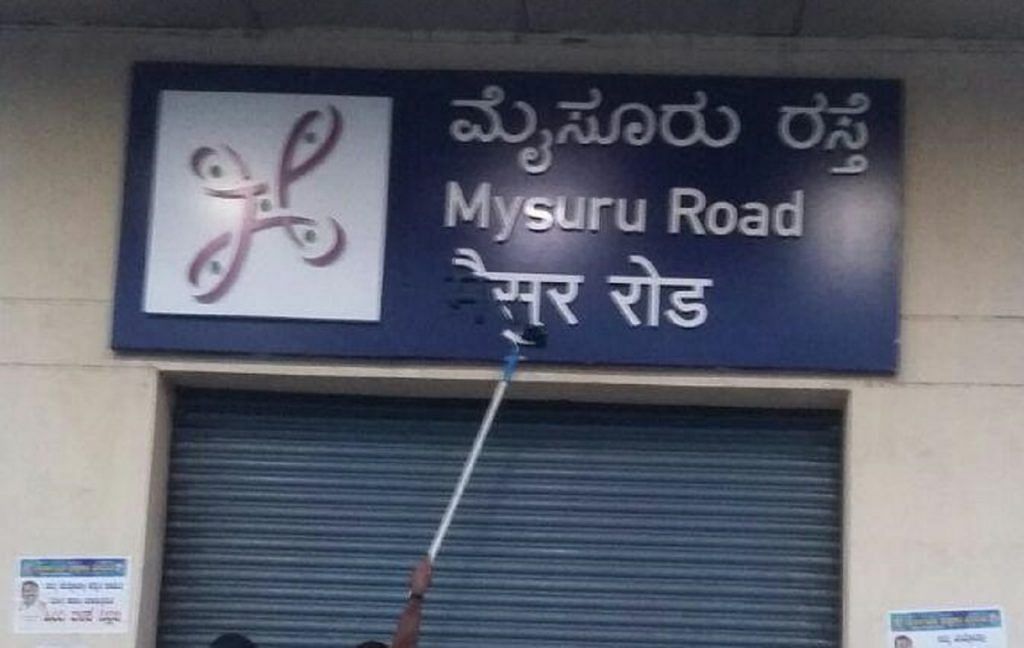Even before the assertion of Kannada pride under Siddaramaiah, non-native speakers started learning the language. But imposition remains a thorny issue.
Bengaluru: Last week, when Prime Minister Narendra Modi addressed a public meeting in Bengaluru, he made sure that he began and concluded his 90-minute speech in Kannada. It certainly wasn’t the first time a prime minister or a national leader resorted to what is now a fairly common tactic to connect with local crowds around the country.
But Modi’s lines were the longest sentences spoken by any non-Kannada speaking leader from Delhi in recent memory. With just months to go before the state elects a new assembly, the messaging did not need any translation.
Not only was the Prime Minister trying hard to identify himself with the people of Karnataka, the effort was also seen as an attempt to counter Chief Minister Siddaramaiah, who has, in the last one year or so, given such importance to Kannada that it has turned into an issue of Kannada identity or ‘asmita’.
In the last few months, Siddaramaiah’s Congress government has consciously ensured that announcements on ‘Namma Metro’ (our metro) in Bengaluru do not follow the customary three-language formula. Instead, the announcements follow the Tamil Nadu model, where they are made only in Tamil and English.
Pro-Kannada organisations have appreciated this, as they believe it has restored some identity of the Kannadigas, the booming capital city of whose state has seen a huge influx of people speaking different tongues from around the country in the last two decades.
“Why should Hindi be imposed on us when it is not our national language? In several parts of Karnataka, many central government agencies are not using Kannada even on their boards,” said S.G. Siddaramaiah, chairman of the Kannada Development Authority (KDA). “Yes, we must follow a three-language policy, but top priority must be given to Kannada.”
Efforts to teach and learn
While the government’s new efforts to promote Kannada have an obvious tinge of politics, migrants to Bengaluru have been learning Kannada for multiple reasons, including bargaining with the ubiquitous auto-rickshaw drivers.
And there have been several independent efforts to propagate the language. One such is the online and offline classes organised by a group of youngsters under the name Kannadagotilla.com (which means ‘I don’t know Kannada’). With nearly 9,000 students, a wholehearted effort is being made to teach people from the age of 16 to 60 to speak Kannada.
“We Kannadigas are very accommodative and tend to learn the language of those who are speaking to us – be it Hindi, Tamil or many others,” said Ranju Krishna, part of the Kannadagotilla team. “We are linguistically very adaptive, so people don’t find it necessary to learn our language. But only if we inculcate that pride among local Kannadigas can we encourage others to learn. We should not judge others; we should encourage them.”
There is also a newly-acquired passion among parents from other linguistic backgrounds to get their children to learn the language, as it has become a compulsory language to be learnt. And to help their children, parents have started learning to read and write Kannada too.
“If I have to teach my daughter at home, I have to learn Kannada first,” said Sarmishta, a parent. “We don’t look at it as an imposition, because wherever we go, we have seen that learning the local language is a must. If we were in Kolkata, my child would have had to learn Bengali, so it is the same here.”
“Teaching and using Kannada to help get jobs is fine. But it’s not fair to force a language on someone,” she added.
Against imposition
Singer-composer Raghu Dixit is among those who feel there’s no need to impose. Dixit, who has in his own way modernised Kannada folk songs and brought people from all parts of the world closer to Kannada language and culture, feels the effort to acknowledge one’s Kannada roots should begin with oneself.
“Several auto and taxi drivers speak in Hindi naturally to clients. I would urge them to first speak in Kannada, and if the client does not understand, then speak in a different language. That way, you are upholding your identity as a Kannadiga, and also accommodating others who do not know the language,” Dixit said.
“If you use the Karnataka state flag during the Rajyotsava, I would very proudly salute the flag or wear a badge which reflects it, as it is a matter of pride. But using the language or the flag as a tool to create violence and get political mileage, which is what we see today, is not acceptable,” he added.
A different take
Ramzan Darga, a prominent writer and a Muslim who teaches Basava philosophy and Veerashaivism, has a different take.
“Who is a Kannadiga? A person who can understand and speak Kannada. Kannada culture has no particular logic,” he said.
“If a person comes from Kashmir and understands the language, speaks it and embraces its literary world, he becomes a Kannadiga for me,” Darga added. “A Kannadiga is not bound by any cultural or geographical limits.”
